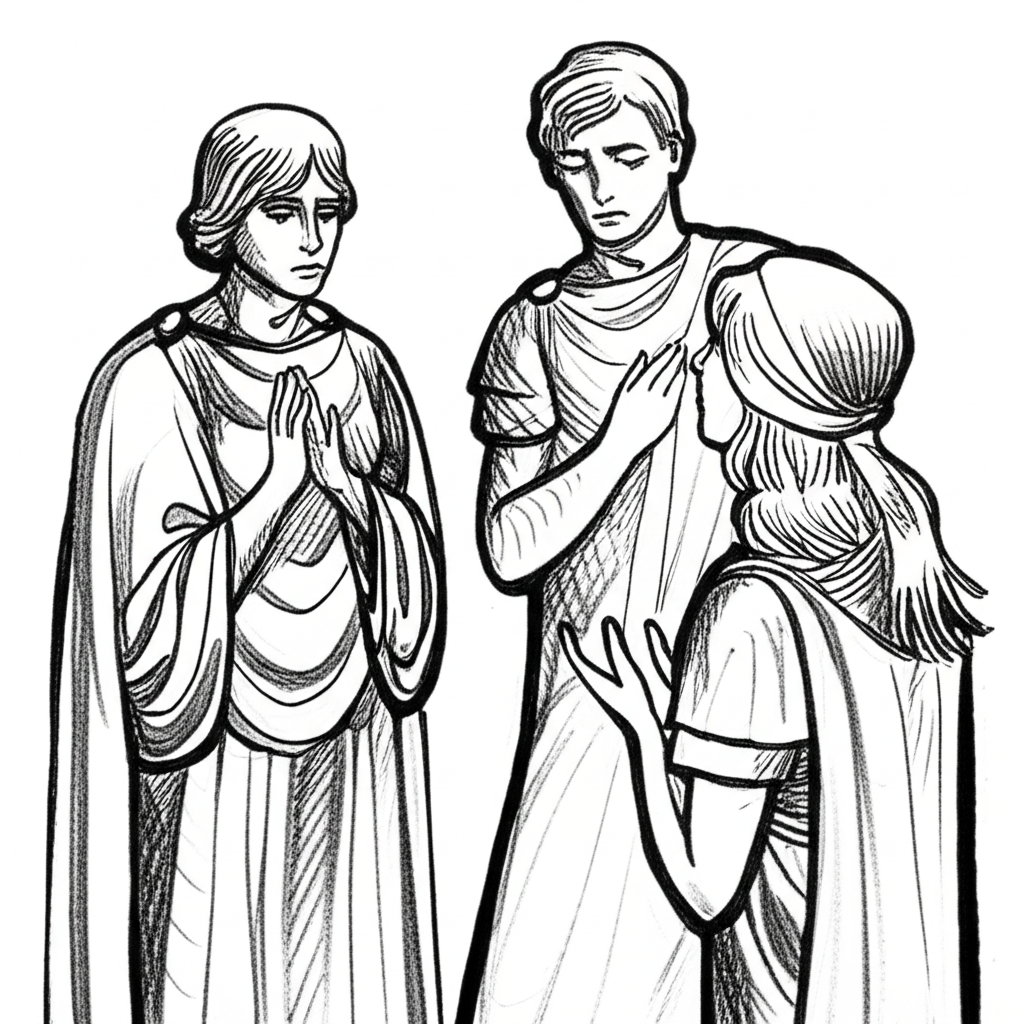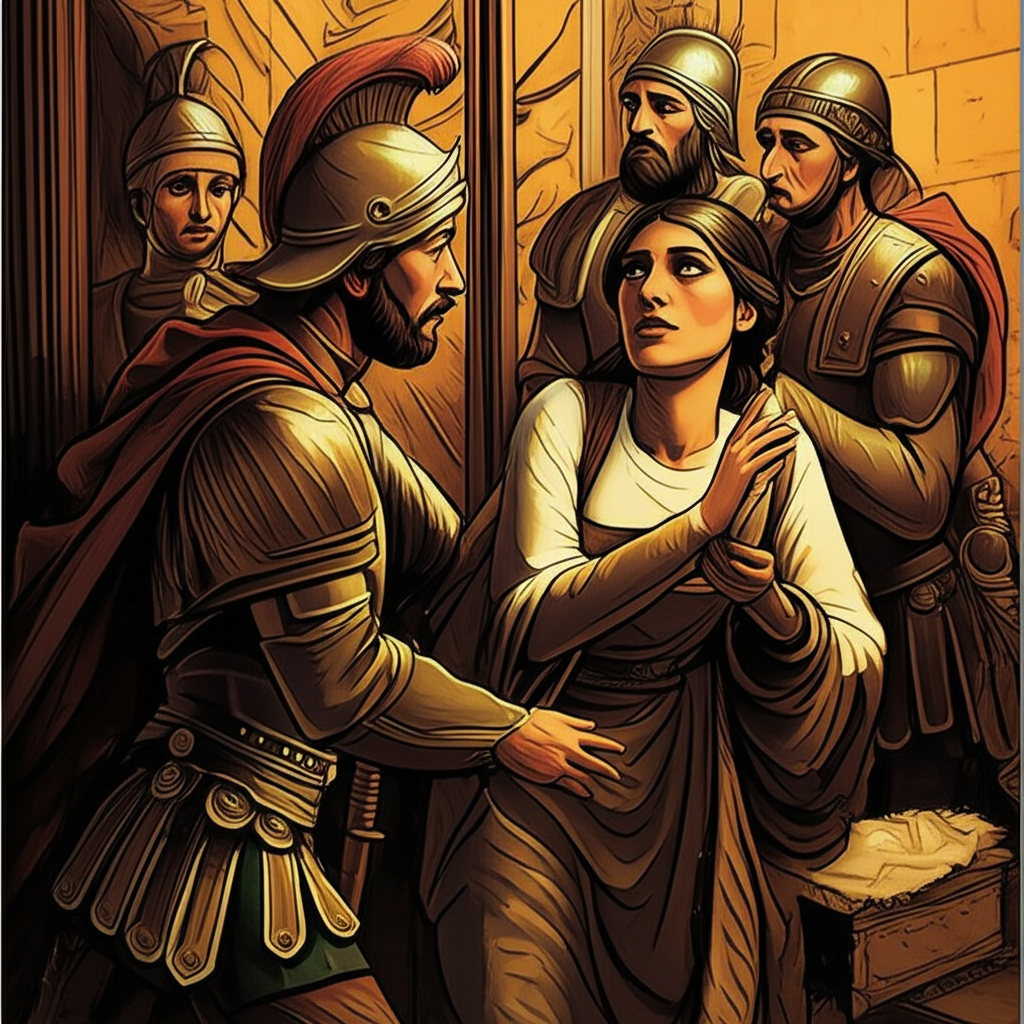Song Of Solomon 5 meaning explained in AI Summary
Chapter 5 of the Song of Solomon continues the theme of love and desire, exploring the challenges and obstacles that can arise in a relationship.
The woman describes a dream in which she searches for her beloved but cannot find him. She expresses her sadness and longing for his return.
The man then appears, describing how he was driven away by the watchmen of the city. He expresses his longing for the woman and his desire to be with her again.
Meaning and Significance
- The Challenges of Love: The separation between the man and woman highlights the difficulties that can arise in a relationship, such as misunderstandings, disagreements, or external pressures.
- The Power of Love to Overcome Challenges: Despite the challenges, the man and woman continue to express their love and desire for each other. This suggests that true love can overcome obstacles and endure.
Application
- Perseverance in Love: The chapter encourages perseverance in seeking love and connection.
- The Intensity of Love: It reminds us of the powerful emotions that can be experienced in love.
- The Mystery of Love: The nighttime setting suggests the mysterious and elusive nature of love.
Overall, Chapter 5 of the Song of Solomon provides a more complex exploration of love, acknowledging the challenges that can arise but also affirming the enduring power of the emotional connection between two people.
Song Of Solomon 5 bible study ai commentary
Song of Solomon chapter 5 presents a critical turning point in the love story, moving from the height of marital union to the pain of separation and longing, which then blossoms into a beautiful testimony of the beloved's matchless worth. The chapter follows a powerful cycle: communion is disrupted by complacency, leading to a desperate search born of regret, and culminating in a detailed, passionate praise of the beloved, rekindling the bride's own appreciation for whom she had momentarily neglected.
Song Of Solomon 5 context
This chapter draws heavily on ancient Near Eastern wedding and garden imagery. A "garden" was a common metaphor for the bride's body and a place of protected, intimate delight. The use of expensive spices like myrrh and frankincense signifies great value, love, and royalty. The crisis with the watchmen reflects the potential harshness or misunderstanding of the outside world toward a lover's desperate, unconventional search in the night. The dialogue format, especially the descriptive poem known as a wasf (verses 10-16), was a recognized literary form for praising a lover's physical beauty.
Song of Solomon 5:1
I have come to my garden, my sister, my bride; I have gathered my myrrh with my spice, I have eaten my honeycomb with my honey, I have drunk my wine with my milk. Eat, friends, and drink! Drink freely, beloved ones.
In-depth-analysis
- This verse represents the consummation and joyful celebration of the marriage. The groom (Solomon/the Beloved) enters his "garden" (the Bride), a place now belonging to him.
- My Sister, my Bride: This dual title signifies a relationship of both deep companionship and covenantal intimacy.
- The five pairs of sensory items (myrrh/spice, honeycomb/honey, wine/milk) create a rich picture of complete satisfaction and delight, engaging all senses.
- Eat, friends, and drink!: This is likely a divine affirmation or a call to the wedding guests, blessing the union. It moves from personal communion to communal celebration, affirming that this love is good and should be celebrated. Typologically, it is God the Father's blessing upon the union of Christ and His Church.
Bible references
- Gen 2:24: "...they shall become one flesh." (The foundational principle of marriage consummation).
- Isa 55:1: "Come, everyone who thirsts, come to the waters; and he who has no money, come, buy and eat! Come, buy wine and milk without money and without price." (Echoes the invitation to a free and joyful feast).
- John 3:29: "The one who has the bride is the bridegroom. The friend of the bridegroom... rejoices greatly at the bridegroom's voice." (The joy of the 'friends' at the union).
Cross references
Eph 5:25-32 (Christ and the Church as bride), Rev 19:7-9 (the marriage supper of the Lamb), SS 4:16 (the bride's invitation which is now answered).
Song of Solomon 5:2
I slept, but my heart was awake. A sound! My beloved is knocking. "Open to me, my sister, my love, my dove, my perfect one, for my head is wet with dew, my locks with the drops of the night."
In-depth-analysis
- A dramatic shift in tone from celebratory union to relational crisis.
- I slept, but my heart was awake: Describes a state of spiritual complacency or emotional drowsiness. She is physically resting but inwardly aware, yet not responsive. This is not deep sleep, but a lethargic state.
- The beloved's gentle "knocking" signifies a persistent, non-coercive desire for fellowship.
- My sister, my love, my dove, my perfect one: He uses a tender, escalating string of four endearing titles, affirming his unchanging love despite her unresponsiveness.
- My head is wet with dew: This illustrates his patient waiting outside, enduring the discomfort of the night for the sake of communion with her. It highlights his sacrificial effort and her careless indifference.
Bible references
- Rev 3:20: "Behold, I stand at the door and knock. If anyone hears my voice and opens the door, I will come in to him and eat with him, and he with me." (Christ seeking fellowship with the lukewarm Laodicean church).
- Luke 12:36: "...be like men who are waiting for their master to come home from the wedding feast, so that they may open the door to him at once when he comes and knocks." (The call to be watchful and ready).
Cross references
Matt 25:5 (wise and foolish virgins slumbered), Jam 4:8 (draw near to God), Eph 5:14 ("Awake, O sleeper...").
Song of Solomon 5:3
I had put off my garment; how could I put it on? I had washed my feet; how could I soil them?
In-depth-analysis
- The bride offers two selfish, flimsy excuses centered on her own comfort and convenience.
- This represents a heart that has become too comfortable, prizing its own ease over fellowship with the beloved. It is the voice of spiritual apathy.
- The questions ("how could I...") are rhetorical justifications for inaction, revealing a momentary loss of perspective on the supreme value of her husband.
Bible references
- Luke 11:7: "And he from within will answer and say, 'Do not bother me; the door is now shut, and my children are with me in bed. I cannot get up and give you anything.'" (An analogy of making excuses, though in a different context).
- Prov 19:15: "Slothfulness casts into a deep sleep, and an idle person will suffer hunger." (The spiritual consequences of inaction).
Cross references
Prov 6:9-11 (danger of laziness), Heb 12:1 (lay aside every weight and sin).
Song of Solomon 5:4
My beloved put his hand to the latch, and my heart was stirred for him.
In-depth-analysis
- This act is the turning point. It is a more intimate and desperate attempt to enter, signaling his impending departure.
- The "latch" or opening represents an appeal to her innermost being.
- My heart was stirred for him: The Hebrew for "heart" here (me'ah) literally means bowels or inward parts, indicating a profound, gut-level emotional response. His action finally breaks through her apathy and awakens her desire.
Bible references
- Isa 26:9: "My soul yearns for you in the night; my spirit within me earnestly seeks you." (The feeling of deep, internal longing for God).
- Jer 31:20: "...therefore my inner parts are stirred for him; I will surely have mercy on him, declares the Lord." (The same Hebrew term used for God's deep compassion).
Cross references
Lam 1:20 (inward parts are in turmoil), Psa 42:1-2 (thirsting for God).
Song of Solomon 5:5
I arose to open to my beloved, and my hands dripped with myrrh, my fingers with liquid myrrh, on the handles of the bolt.
In-depth-analysis
- She finally acts, but it is too late.
- The "liquid myrrh" is symbolic. It's not that he literally coated the handle. Rather, her own preparation for him (as a bride, myrrh was an anointing oil and perfume) now serves as a fragrant, painful reminder of the love she has just neglected.
- The myrrh also carries connotations of suffering and burial, foreshadowing the pain she is about to experience because of her delay.
Bible references
- Esther 2:12: "...six months with oil of myrrh..." (Myrrh used in lengthy bridal preparations, signifying high value).
- Matt 2:11: "[The magi] offered him gifts, gold and frankincense and myrrh." (Myrrh as a gift for royalty).
- John 19:39: "Nicodemus... came bringing a mixture of myrrh and aloes... for Jesus' burial." (Myrrh's connection to death and suffering).
Cross references
Exo 30:23 (myrrh in holy anointing oil), Psa 45:8 (garments scented with myrrh).
Song of Solomon 5:6
I opened to my beloved, but my beloved had withdrawn and was gone. My soul failed me when he spoke. I sought him, but found him not; I called him, but he gave no answer.
In-depth-analysis
- The devastating consequence of her hesitation is realized: he is gone. Fellowship, once available, is now lost.
- My soul failed me when he spoke: This likely refers back to his initial plea in verse 2. She now realizes the gravity of her rejection, and her spirit sinks at the memory of his loving words which she ignored.
- Her frantic search and unanswered calls contrast sharply with her earlier passivity, illustrating a common spiritual pattern: taking God's presence for granted, followed by desperate seeking after a period of perceived absence.
Bible references
- Isa 55:6: "Seek the LORD while he may be found; call upon him while he is near." (A warning that the opportunity for fellowship is not indefinite).
- Hos 5:6: "With their flocks and herds they shall go to seek the LORD, but they will not find him; he has withdrawn from them." (God withdrawing his presence due to sin and unfaithfulness).
Cross references
Prov 1:28 (wisdom calls but is ignored), Amo 8:12 (famine of hearing the words of the LORD).
Song of Solomon 5:7
The watchmen found me as they went about in the city; they beat me, they bruised me, they took away my veil from me, the keepers of the walls.
In-depth-analysis
- This is a stark contrast to the helpful watchmen in chapter 3. Here, the guardians of the city's peace and order inflict violence on her.
- Symbolic Interpretations:
- Legalism: They could represent a harsh, unfeeling religious system that wounds a soul genuinely seeking her beloved but not following the "rules."
- A Hostile World: They could be the world's harsh response to a love it does not understand.
- Painful Providence: It may be part of God's sovereign plan to use painful experiences to discipline and purify her love.
- They took away my veil: The veil was a symbol of her honor, modesty, and protected status as a married woman. Its removal was an act of profound humiliation and shame.
Bible references
- 2 Cor 11:25: "Three times I was beaten with rods. Once I was stoned." (Paul lists the suffering he endured for Christ's sake, a 'wounded lover').
- Heb 12:11: "For the moment all discipline seems painful rather than pleasant, but later it yields the peaceful fruit of righteousness..." (Suffering as a means of discipline).
Cross references
Psa 119:67 (affliction as a teacher), Lam 3:1-18 (deep suffering and abandonment).
Song of Solomon 5:8
I adjure you, O daughters of Jerusalem, if you find my beloved, that you tell him I am sick with love.
In-depth-analysis
- She turns from the hostile watchmen to the "daughters of Jerusalem" (her peers, fellow believers).
- I adjure you: A solemn oath or charge, showing the desperation and intensity of her need.
- I am sick with love: The Hebrew indicates lovesickness—a state of being overwhelmed and faint with longing. Her casual complacency (v. 3) has been transformed by her loss and suffering into a desperate, all-consuming passion. Her pain has purified and intensified her desire.
Bible references
- 2 Cor 7:10: "For godly grief produces a repentance that leads to salvation without regret, whereas worldly grief produces death." (Her sorrow is a 'godly grief' leading her back to her beloved).
- Psa 42:1: "As a deer pants for flowing streams, so pants my soul for you, O God." (A perfect picture of being 'sick with love' for God).
Cross references
SS 2:5 (a previous, less painful instance of lovesickness), Psa 63:1 (soul thirsts in a dry land).
Song of Solomon 5:9
What is your beloved more than another beloved, O most beautiful among women? What is your beloved more than another beloved, that you charge us so?
In-depth-analysis
- The "daughters of Jerusalem" respond with a crucial, twofold question. It's a sincere, not a mocking, question. They recognize her beauty but are perplexed by the intensity of her devotion.
- This question acts as a narrative catalyst. It forces the bride to move from simply feeling her love and loss to articulating the specific, unique excellencies of her beloved.
- The challenge becomes her opportunity to give a testimony. In recalling his virtues, she strengthens her own resolve and preaches to others.
Bible references
- 1 Pet 3:15: "...always being prepared to make a defense to anyone who asks you for a reason for the hope that is in you; yet do it with gentleness and respect." (The call to articulate the reason for one's faith/love).
Cross references
Psa 73:25 (whom have I in heaven but you?), Phi 3:8 (counting all things as loss for Christ).
Song of Solomon 5:10-16
(v10) My beloved is radiant and ruddy, distinguished among ten thousand. (v11) His head is the finest gold; his locks are wavy, black as a raven. (v12) His eyes are like doves beside streams of water, bathed in milk, sitting beside a full pool. (v13) His cheeks are like a bed of spices, mounds of sweet-smelling herbs. His lips are lilies, dripping liquid myrrh. (v14) His arms are rods of gold, set with beryl. His body is polished ivory, bedecked with sapphires. (v15) His legs are alabaster columns, set on bases of gold. His appearance is like Lebanon, choice as the cedars. (v16) His mouth is most sweet, and he is altogether lovely. This is my beloved, and this is my friend, O daughters of Jerusalem.
In-depth-analysis
This section is a wasf, a poetic description from head to foot, answering the question from verse 9. Each element is metaphorical, portraying his value, character, and beauty.
- v10: Radiant and ruddy: Suggests purity, health, and vitality. Echoes descriptions of David (1 Sam 16:12). Distinguished among ten thousand: He is utterly unique and supreme.
- v11: Head is the finest gold: Represents supreme value, purity, and divine authority (as in Christ's deity). Locks... black as a raven: Signifies vigor and undiminished youthfulness.
- v12: Eyes are like doves: Represent gentleness, tenderness, purity, and singular focus.
- v13: Cheeks are like a bed of spices... Lips are lilies: His presence is fragrant and refreshing. His words ("lips") are beautiful and dispense grace and life ("dripping liquid myrrh").
- v14: Arms are rods of gold... body is polished ivory: Denotes strength, preciousness, purity, and perfection.
- v15: Legs are alabaster columns on bases of gold: Signify immense strength, stability, and dependability. His entire stature (appearance) is majestic and strong like the famous cedars of Lebanon.
- v16: Mouth is most sweet: Literally "sweetnesses," a plural of intensity. His speech and communication are exceptionally pleasant.
- Word: He is altogether lovely: The Hebrew is mahamaddim. It is the plural of
mahmad(desire, delight, lovely thing). It means he is the embodiment of all that is desirable; "desirableness itself." - This is my beloved, and this is my friend: Her description concludes with this bold, personal, and possessive declaration. He is not just an object of admiration but a close, personal companion.
Bible references
- Psa 45:2: "You are fairer than the children of men; Grace is poured upon Your lips..." (A Messianic psalm describing the King's beauty).
- Rev 1:14-16: "His head and his hairs were white like wool... His eyes were as a flame of fire... and his countenance was as the sun shineth in his strength." (A parallel, divine description of the glorified Christ).
- Phil 2:9: "Therefore God has highly exalted him and bestowed on him the name that is above every name..." (Relates to being 'distinguished among ten thousand').
- Col 1:18: "...that in everything he might be preeminent." (He holds first place in all things).
Cross references
Dan 10:5-6 (description of a divine man), Eze 1:26-28 (vision of God's glory), Isa 33:17 (your eyes will see the king in his beauty).
Polemics
- Some Islamic apologists claim that the Hebrew word mahamaddim in verse 16 is a direct prophecy of Muhammad, as the names share a common Semitic root (HMD, meaning desire or praise). This interpretation is rejected by linguistic and biblical scholars for several key reasons:
- Grammar: Mahamaddim is a plural noun used as an adjective, meaning "altogether lovely" or "all delights." It is not a proper name.
- Context: The Shulamite is describing her beloved to answer the question, "What is your beloved...?" The entire passage is a description of his attributes, not a prediction of a future prophet's name.
- Consistency: No other prophetic name in the Bible is introduced in such a manner, as the culminating adjective in a poetic list of physical and character qualities.
Song Of Solomon chapter 5 analysis
- The Structure of Crisis and Praise: The chapter is a chiasm centered on the daughters' question: A) Intimacy (v. 1) -> B) Separation and Search (v. 2-8) -> C) The pivotal question (v. 9) -> B') The glorious answer/praise (v. 10-16a) -> A') Reaffirmation of relationship (v. 16b).
- Spiritual Complacency: The chapter serves as a powerful allegory for the believer or the Church becoming complacent in its relationship with Christ. The warmth and security of salvation can lead to a spiritual drowsiness where the call to deeper fellowship is ignored out of self-centered comfort.
- The Value of "Winter" Seasons: The beloved's withdrawal is not final. It is a 'divine discontent' designed to awaken the bride from her apathy. The suffering and desperate search that follow, though painful, ultimately lead to a much deeper, more articulate, and more cherished appreciation for her beloved. The experience turns her weak love into a robust and testifying love.
- Praise as a Path to Presence: When the bride articulates the glories of her beloved, she is not only instructing the daughters of Jerusalem but also rekindling her own heart and, in a sense, drawing him back to her. Meditating on and declaring the glories of Christ is a primary way believers move from a sense of distance to a renewed sense of His presence. The best answer to spiritual dryness is to remember and declare who God is.
Song Of Solomon 5 summary
The chapter opens with the joyous consummation of marriage, but quickly descends into a crisis as the bride, in a state of comfortable apathy, hesitates to open the door for her waiting beloved. Her delay leads to his departure, prompting a frantic and painful search where she is wounded by the city watchmen. This crucible of suffering intensifies her love. When questioned by the daughters of Jerusalem about what makes her beloved so special, she responds with a magnificent, detailed poem of praise, describing his unparalleled beauty and value from head to toe, culminating in the declaration that this "altogether lovely" one is her beloved and her friend.
Song Of Solomon 5 AI Image Audio and Video









Song Of Solomon chapter 5 kjv
- 1 I am come into my garden, my sister, my spouse: I have gathered my myrrh with my spice; I have eaten my honeycomb with my honey; I have drunk my wine with my milk: eat, O friends; drink, yea, drink abundantly, O beloved.
- 2 I sleep, but my heart waketh: it is the voice of my beloved that knocketh, saying, Open to me, my sister, my love, my dove, my undefiled: for my head is filled with dew, and my locks with the drops of the night.
- 3 I have put off my coat; how shall I put it on? I have washed my feet; how shall I defile them?
- 4 My beloved put in his hand by the hole of the door, and my bowels were moved for him.
- 5 I rose up to open to my beloved; and my hands dropped with myrrh, and my fingers with sweet smelling myrrh, upon the handles of the lock.
- 6 I opened to my beloved; but my beloved had withdrawn himself, and was gone: my soul failed when he spake: I sought him, but I could not find him; I called him, but he gave me no answer.
- 7 The watchmen that went about the city found me, they smote me, they wounded me; the keepers of the walls took away my veil from me.
- 8 I charge you, O daughters of Jerusalem, if ye find my beloved, that ye tell him, that I am sick of love.
- 9 What is thy beloved more than another beloved, O thou fairest among women? what is thy beloved more than another beloved, that thou dost so charge us?
- 10 My beloved is white and ruddy, the chiefest among ten thousand.
- 11 His head is as the most fine gold, his locks are bushy, and black as a raven.
- 12 His eyes are as the eyes of doves by the rivers of waters, washed with milk, and fitly set.
- 13 His cheeks are as a bed of spices, as sweet flowers: his lips like lilies, dropping sweet smelling myrrh.
- 14 His hands are as gold rings set with the beryl: his belly is as bright ivory overlaid with sapphires.
- 15 His legs are as pillars of marble, set upon sockets of fine gold: his countenance is as Lebanon, excellent as the cedars.
- 16 His mouth is most sweet: yea, he is altogether lovely. This is my beloved, and this is my friend, O daughters of Jerusalem.
Song Of Solomon chapter 5 nkjv
- 1 I have come to my garden, my sister, my spouse; I have gathered my myrrh with my spice; I have eaten my honeycomb with my honey; I have drunk my wine with my milk. Eat, O friends! Drink, yes, drink deeply, O beloved ones!
- 2 I sleep, but my heart is awake; It is the voice of my beloved! He knocks, saying, "Open for me, my sister, my love, My dove, my perfect one; For my head is covered with dew, My locks with the drops of the night."
- 3 I have taken off my robe; How can I put it on again? I have washed my feet; How can I defile them?
- 4 My beloved put his hand By the latch of the door, And my heart yearned for him.
- 5 I arose to open for my beloved, And my hands dripped with myrrh, My fingers with liquid myrrh, On the handles of the lock.
- 6 I opened for my beloved, But my beloved had turned away and was gone. My heart leaped up when he spoke. I sought him, but I could not find him; I called him, but he gave me no answer.
- 7 The watchmen who went about the city found me. They struck me, they wounded me; The keepers of the walls Took my veil away from me.
- 8 I charge you, O daughters of Jerusalem, If you find my beloved, That you tell him I am lovesick!
- 9 What is your beloved More than another beloved, O fairest among women? What is your beloved More than another beloved, That you so charge us?
- 10 My beloved is white and ruddy, Chief among ten thousand.
- 11 His head is like the finest gold; His locks are wavy, And black as a raven.
- 12 His eyes are like doves By the rivers of waters, Washed with milk, And fitly set.
- 13 His cheeks are like a bed of spices, Banks of scented herbs. His lips are lilies, Dripping liquid myrrh.
- 14 His hands are rods of gold Set with beryl. His body is carved ivory Inlaid with sapphires.
- 15 His legs are pillars of marble Set on bases of fine gold. His countenance is like Lebanon, Excellent as the cedars.
- 16 His mouth is most sweet, Yes, he is altogether lovely. This is my beloved, And this is my friend, O daughters of Jerusalem!
Song Of Solomon chapter 5 niv
- 1 I have come into my garden, my sister, my bride; I have gathered my myrrh with my spice. I have eaten my honeycomb and my honey; I have drunk my wine and my milk. Eat, friends, and drink; drink your fill of love.
- 2 I slept but my heart was awake. Listen! My beloved is knocking: "Open to me, my sister, my darling, my dove, my flawless one. My head is drenched with dew, my hair with the dampness of the night."
- 3 I have taken off my robe? must I put it on again? I have washed my feet? must I soil them again?
- 4 My beloved thrust his hand through the latch-opening; my heart began to pound for him.
- 5 I arose to open for my beloved, and my hands dripped with myrrh, my fingers with flowing myrrh, on the handles of the bolt.
- 6 I opened for my beloved, but my beloved had left; he was gone. My heart sank at his departure. I looked for him but did not find him. I called him but he did not answer.
- 7 The watchmen found me as they made their rounds in the city. They beat me, they bruised me; they took away my cloak, those watchmen of the walls!
- 8 Daughters of Jerusalem, I charge you? if you find my beloved, what will you tell him? Tell him I am faint with love.
- 9 How is your beloved better than others, most beautiful of women? How is your beloved better than others, that you so charge us?
- 10 My beloved is radiant and ruddy, outstanding among ten thousand.
- 11 His head is purest gold; his hair is wavy and black as a raven.
- 12 His eyes are like doves by the water streams, washed in milk, mounted like jewels.
- 13 His cheeks are like beds of spice yielding perfume. His lips are like lilies dripping with myrrh.
- 14 His arms are rods of gold set with topaz. His body is like polished ivory decorated with lapis lazuli.
- 15 His legs are pillars of marble set on bases of pure gold. His appearance is like Lebanon, choice as its cedars.
- 16 His mouth is sweetness itself; he is altogether lovely. This is my beloved, this is my friend, daughters of Jerusalem.
Song Of Solomon chapter 5 esv
- 1 I came to my garden, my sister, my bride, I gathered my myrrh with my spice, I ate my honeycomb with my honey, I drank my wine with my milk. Others Eat, friends, drink, and be drunk with love!
- 2 I slept, but my heart was awake. A sound! My beloved is knocking. "Open to me, my sister, my love, my dove, my perfect one, for my head is wet with dew, my locks with the drops of the night."
- 3 I had put off my garment; how could I put it on? I had bathed my feet; how could I soil them?
- 4 My beloved put his hand to the latch, and my heart was thrilled within me.
- 5 I arose to open to my beloved, and my hands dripped with myrrh, my fingers with liquid myrrh, on the handles of the bolt.
- 6 I opened to my beloved, but my beloved had turned and gone. My soul failed me when he spoke. I sought him, but found him not; I called him, but he gave no answer.
- 7 The watchmen found me as they went about in the city; they beat me, they bruised me, they took away my veil, those watchmen of the walls.
- 8 I adjure you, O daughters of Jerusalem, if you find my beloved, that you tell him I am sick with love.
- 9 What is your beloved more than another beloved, O most beautiful among women? What is your beloved more than another beloved, that you thus adjure us?
- 10 My beloved is radiant and ruddy, distinguished among ten thousand.
- 11 His head is the finest gold; his locks are wavy, black as a raven.
- 12 His eyes are like doves beside streams of water, bathed in milk, sitting beside a full pool.
- 13 His cheeks are like beds of spices, mounds of sweet-smelling herbs. His lips are lilies, dripping liquid myrrh.
- 14 His arms are rods of gold, set with jewels. His body is polished ivory, bedecked with sapphires.
- 15 His legs are alabaster columns, set on bases of gold. His appearance is like Lebanon, choice as the cedars.
- 16 His mouth is most sweet, and he is altogether desirable. This is my beloved and this is my friend, O daughters of Jerusalem.
Song Of Solomon chapter 5 nlt
- 1 I have entered my garden, my treasure, my bride!
I gather myrrh with my spices
and eat honeycomb with my honey.
I drink wine with my milk. Young Women of Jerusalem
Oh, lover and beloved, eat and drink!
Yes, drink deeply of your love! - 2 I slept, but my heart was awake,
when I heard my lover knocking and calling:
"Open to me, my treasure, my darling,
my dove, my perfect one.
My head is drenched with dew,
my hair with the dampness of the night." - 3 But I responded,
"I have taken off my robe.
Should I get dressed again?
I have washed my feet.
Should I get them soiled?" - 4 My lover tried to unlatch the door,
and my heart thrilled within me. - 5 I jumped up to open the door for my love,
and my hands dripped with perfume.
My fingers dripped with lovely myrrh
as I pulled back the bolt. - 6 I opened to my lover,
but he was gone!
My heart sank.
I searched for him
but could not find him anywhere.
I called to him,
but there was no reply. - 7 The night watchmen found me
as they made their rounds.
They beat and bruised me
and stripped off my veil,
those watchmen on the walls. - 8 Make this promise, O women of Jerusalem ?
If you find my lover,
tell him I am weak with love. - 9 Why is your lover better than all others,
O woman of rare beauty?
What makes your lover so special
that we must promise this? - 10 My lover is dark and dazzling,
better than ten thousand others! - 11 His head is finest gold,
his wavy hair is black as a raven. - 12 His eyes sparkle like doves
beside springs of water;
they are set like jewels
washed in milk. - 13 His cheeks are like gardens of spices
giving off fragrance.
His lips are like lilies,
perfumed with myrrh. - 14 His arms are like rounded bars of gold,
set with beryl.
His body is like bright ivory,
glowing with lapis lazuli. - 15 His legs are like marble pillars
set in sockets of finest gold.
His posture is stately,
like the noble cedars of Lebanon. - 16 His mouth is sweetness itself;
he is desirable in every way.
Such, O women of Jerusalem,
is my lover, my friend.
- Bible Book of Song Of Solomon
- 1 The Bride Confesses Her Love
- 2 The Bride Adores Her Beloved
- 3 The Bride's Dream
- 4 Solomon Admires His Bride's Beauty
- 5 The Bride Searches for Her Beloved
- 6 Together in the Garden of Love
- 7 The Bride Gives Her Love
- 8 Longing for Her Beloved